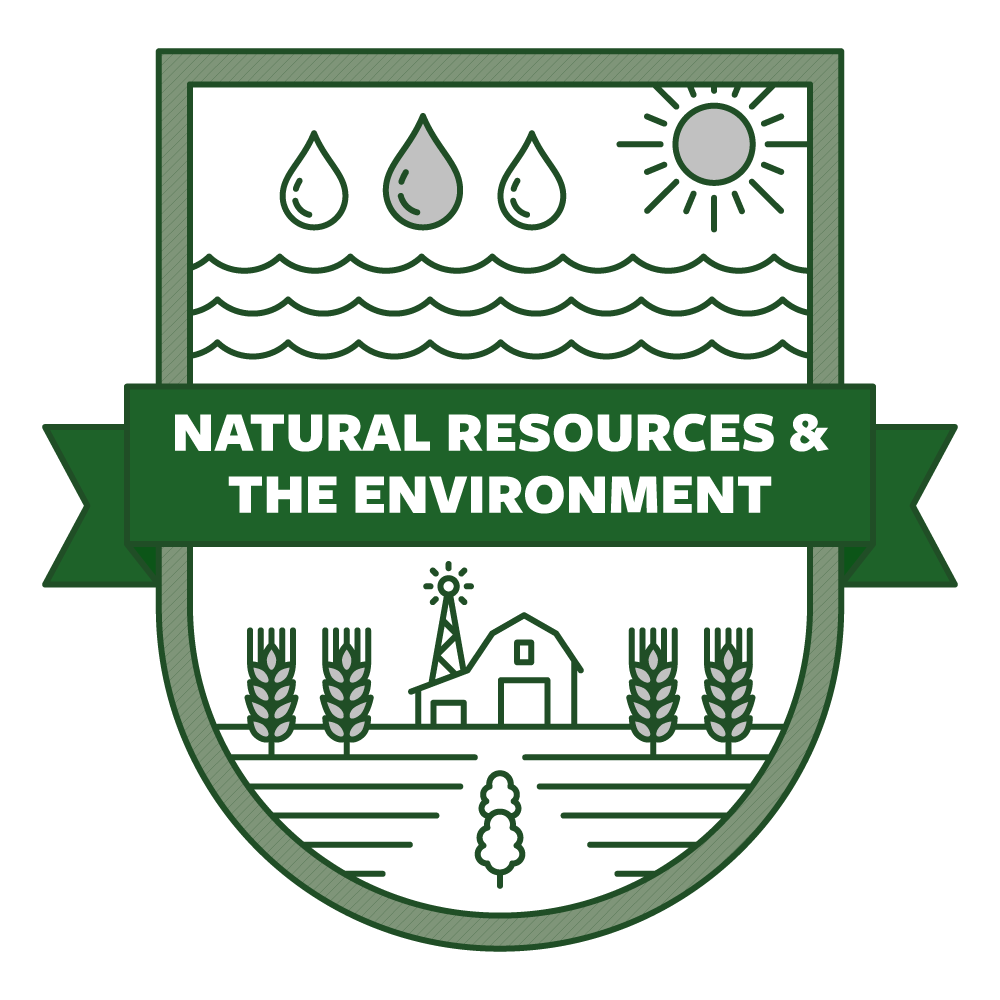Courses Offered at
Online
Woodland Campus
Certificates & Degrees
Ready to get started?
Apply and get ready for our next term:
- Fall 2025 — Classes start Aug 11
About the Agriculture Discipline
With this field of study you will engage in pathways focused on animal science and agriculture business - both critical in providing food and agricultural products for consumers. You will engage with key aspects of animal production, health and nutrition, as well as ag economics - all focused on keeping producers in business. The pathway in agriculture business will provide a foundation in Microsoft Office and the accounting principles needed to be successful in an ag business.
Certificates in Agriculture
The Agriculture Business Certificate of Achievement is designed for students interested in working in the area of agricultural related business. Career opportunities in agricultural business may include working in banking, agricultural/farm credit, agricultural insurance, consulting firms, or agricultural product distribution and sales. The agricultural business sector is infused within all aspects of agriculture: across production, processing, distribution, and support opportunities linked to agriculture. In the state of California, agriculture is the #1 commodity which further increases our student’s employment opportunities.
This certificate is designed to provide students with a solid business foundation related to the agriculture industry, using specific commodity examples that are marketed and sold. This program also prepares students to transfer to an Agriculture Business program at a four-year university. Students who plan to transfer should talk to a counselor or advisor to select appropriate general education and elective courses that will meet the requirements of the chosen university program.
Program maps suggest courses to take by semester and include career and transfer information when available.
Required Courses for this major (15 Units)
- AG4 Introduction to Agricultural Business (3 Units)
- AG5 Agriculture Economics (3 Units)
- AG11 Agricultural Accounting (3 Units)
- AG12 Computers in Agriculture (3 Units)
- GNBUS18 Business Law (3 Units)
- Woodland Campus
The Agriculture Mechanics Certificate of Achievement prepares students for entry-level employment in the field of Agriculture Technology as service technicians or mechanics. The courses in this applied pathway are designed with specific emphasis on agriculture mechanics skill development for small scale farming operations. Students will develop skills used in many agriculture industries, which span soft skills, management, operation, maintenance, and repair of equipment.
Program maps suggest courses to take by semester and include career and transfer information when available.
Required Courses for this major (12 Units)
- AG36 Introduction to Agricultural Mechanics (3 Units)
- AG37 Introduction to Agricultural Welding (3 Units)
- AG38 Advanced Agriculture Mechanics and Field Equipment Welding (3 Units)
- AG39 Field Equipment Operation (3 Units)
- Woodland Campus
The Agriculture Research Technician Certificate of Achievement combines preparatory coursework in workforce development with major specific topics in plant or soil science, to develop the pathway within agriculture. Students will be able to develop a base set of skills that are required to be successful in the increasingly complex business and production operations in the agriculture industry. Students will be prepared for this high demand industry following completion of coursework spanning research in workforce and careers, agricultural markets and policies, quantifying the value of farm operations, and recognizing the impact of food production and the environment in sustaining life.
Program maps suggest courses to take by semester and include career and transfer information when available.
Required Courses for this major (16–18 Units)
Required Courses (11 Units)
- AG5 Agriculture Economics (3 Units)
- AG12 Computers in Agriculture (3 Units)
- CHEM2A Introductory Chemistry (5 Units)
Choose one (4 Units)
- PLSCI20L Principles of Plant Science (4 Units)
- PLSCI22L Introduction To Soils (4 Units)
Choose one (1–3 Units)
- AG19 Agricultural Leadership Skills (1 Unit)
- AG20 Agricultural Leadership & Organization (1 Unit)
- AG60 Preparing for 21st Century Workforce in Agriculture (3 Units)
- Woodland Campus
The Environmental Horticulture Certificate provides students with a foundation in plant production and pest management. Students will engage in hands on learning about soils, plants, fertilizers, and pests. Career opportunities in environmental horticulture may include greenhouse production, nursery technician, and landscape maintenance. The Environmental Horticulture Certificate requires 30 major units. Students should see a counselor to develop an education plan.
Program maps suggest courses to take by semester and include career and transfer information when available.
Required Courses for this major (30 Units)
Required Courses (23 Units)
- AG32 Internship (3 Units)
- ENVHR20 Fund of Environmental Horticulture (3 Units)
- ENVHR21 Plant Propagation (3 Units)
- ENVHR24 Greenhouse Management (3 Units)
- PLSCI20L Principles of Plant Science (4 Units)
- PLSCI22L Introduction To Soils (4 Units)
- PLSCI30 Principles of Pest Management (3 Units)
Electives (select 2 courses) (6 Units)
- AG4 Introduction to Agricultural Business (3 Units)
- ENVHR10 General Entomology (3 Units)
- ENVHR11 Landscape Irrigation (3 Units)
- PLSCI12 California Water (3 Units)
- PLSCI21 Fertilizers and Plant Nutrition (3 Units)
- PLSCI25 Field and Vegetable Crops (3 Units)
- PLSCI32 Plant Protection Materials (3 Units)
- PLSCI33 Weed Science (3 Units)
- PLSCI34 Introduction to Plant Pathology (3 Units)
Electives (select 1 course) (1 Unit)
- ENVHR50 The Art of Floral Design (1 Unit)
- ENVHR51 Introduction to Floral Design (1 Unit)
- AG19 Agricultural Leadership Skills (1 Unit)
- AG20 Agricultural Leadership & Organization (1 Unit)
- Woodland Campus
The Plant Protection Certificate of Achievement prepares students to design and implement comprehensive integrated pest management programs for private or public entities. Pest Control Advisers (PCA) provide written recommendations for the application of pesticides, as well as providing guidance to farmers for overall plant health. This certificate satisfies the core-course requirements specified for option “3. b” in preparing to take the Pest Control Adviser’s exam with the California Department of Pesticide Regulation. The following courses need to be completed with a 2.0 grade point average or better.
Note: In addition to completing the course work, the Department of Pesticide Regulation requires PCA exam applicants to have completed 24 months of technical work experience before taking the exam. Courses in the program provide hands-on experiences designed to give students a combination of practical skills and technical knowledge. Students who intend to transfer should meet with a counselor or advisor to review lower-division requirements of the college or university they plan to attend.
Program maps suggest courses to take by semester and include career and transfer information when available.
Required Courses for this major (45 Units)
Physical & Biological Sciences (choose 12 units) (12 Units)
- BIOL1 Principles of Biology (5 Units)
- BIOL2 General Zoology (4 Units)
- BIOL3 General Botany (4 Units)
- BIOL7 Introduction to Biodiversity, Ecology, and Evolution (5 Units)
- BIOL10L General Biology (4 Units)
- BIOL15 Bioscience (4 Units)
- BIOL24 Human Biology (3 Units)
- BIOL25 Human Genetics (3 Units)
- CHEM2A Introductory Chemistry (5 Units)
- CHEM2B Introductory Chemistry (4 Units)
- CHEM10 Concepts of Chemistry (3 Units)
- ECOL10 Environment-Concepts and Issues (3 Units)
- ENVHR15 Introduction to Environmental Science (3 Units)
Crop Health (choose 9 units) (9 Units)
- ENVHR10 General Entomology (3 Units)
- ENVHR11 Landscape Irrigation (3 Units)
- PLSCI12 California Water (3 Units)
- PLSCI21 Fertilizers and Plant Nutrition (3 Units)
- PLSCI22L Introduction To Soils (4 Units)
- PLSCI34 Introduction to Plant Pathology (3 Units)
Pest Management Systems & Methods (choose 6 units) (6 Units)
- ENVHR10 General Entomology (3 Units)
- PLSCI30 Principles of Pest Management (3 Units)
- PLSCI31 Introduction To Sustainable Agriculture (3 Units)
- PLSCI32 Plant Protection Materials (3 Units)
- PLSCI33 Weed Science (3 Units)
- PLSCI34 Introduction to Plant Pathology (3 Units)
Production Systems (choose 6 units) (6 Units)
- AG40 Animal Health and Sanitation (3 Units)
- AG42 Sheep and Goat Science/Production (3 Units)
- AG43 Beef Cattle Science (3 Units)
- AG45 Principles of Animal Science (3 Units)
- AG45L Principles of Animal Science (4 Units)
- AG46 Animal Feeds and Nutrition (3 Units)
- PLSCI11 Introduction To Sustainable Food Systems (3 Units)
- ENVHR20 Fund of Environmental Horticulture (3 Units)
- ENVHR21 Plant Propagation (3 Units)
- ENVHR24 Greenhouse Management (3 Units)
- PLSCI20L Principles of Plant Science (4 Units)
- PLSCI25 Field and Vegetable Crops (3 Units)
Electives: Select 9 units of additional courses listed above from Crop Health, Pest Management Systems & Methods, or Production Systems. (9 Units)
Internship (3 units required) (3 Units)
- AG32 Internship (3 Units)
Note: Minimum of 24 months documented work experience is required by Department of Pesticide Regulation to be eligible to sit for the Pest Control Advisor Exam (http://www.cdpr.ca.gov)
- Woodland Campus
- Fully Online
Woodland Community College is located in Yolo County, home to a diverse group of farms and many Community Supported Agriculture (CSA) groups in the Capay Valley. The Woodland Community College Sustainable Agriculture Certificate of Achievement program is designed to engage students in agricultural practices and techniques that promote sustainability. Core courses introduce students to career opportunities and field experiences, while foundation courses in plant and soil science provide students with background information in general agriculture. The major courses in pest management and sustainable food systems emphasize specific approaches to sustainable agriculture and resources linked to energy. Further, a leadership element to the program prepares students for carrying out projects in agriculture focused on production and supply of nutritious foods.
This program will prepare students for high demand occupations that involve sustainable agriculture practices. Typical jobs include: farming, agriculture production, market gardener, farm manager, propagator, crop consultant, organic inspector, farm advisor, agricultural supplier, compost production, food technologist.
Program maps suggest courses to take by semester and include career and transfer information when available.
Required Courses for this major (20 Units)
Ag Career Core Courses (12 Units)
- AG32 Internship (3 Units)
- ENVHR15 Introduction to Environmental Science (3 Units)
- PLSCI11 Introduction To Sustainable Food Systems (3 Units)
- PLSCI31 Introduction To Sustainable Agriculture (3 Units)
Ag Science Breadth (select 1 course) (4 Units)
- PLSCI20L Principles of Plant Science (4 Units)
- PLSCI22L Introduction To Soils (4 Units)
Leadership (select 1 course) (1 Unit)
- AG15 Introduction To Agriculture Education and Careers (1 Unit)
- AG19 Agricultural Leadership Skills (1 Unit)
- AG20 Agricultural Leadership & Organization (1 Unit)
Electives (select 1 course) (3 Units)
- ENVHR11 Landscape Irrigation (3 Units)
- PLSCI12 California Water (3 Units)
- PLSCI30 Principles of Pest Management (3 Units)
- Woodland Campus
- Fully Online
Associate Degrees in Agriculture
The Associate in Science in Agriculture Animal Science for Transfer is intended for students who plan to complete a bachelor’s degree in Agriculture Animal Science at a CSU campus.
Students who complete an Associate Degree for Transfer (AA-T or AS-T) will receive priority admission with junior status to the California State University System and priority admission consideration to their local CSU campus or to a program that is deemed similar to their community college major. This priority does not guarantee admission to specific majors or campuses. Students should consult with a counselor for more information on specific university major admission and transfer requirements. The following are required for all AA-T or AS-T degrees: – Minimum of 60 CSU transferrable semester units – Minimum grade point average (GPA) of at least 2.0 in all CSU-transferable coursework – Satisfactory completion (C or better OR Pass*) of courses used to satisfy major requirements AND courses used to complete the California General Education Transfer Curriculum (Cal-GETC) requirements *Some majors may not accept a Pass in place of a letter grade. Consult with a counselor before choosing the P/NP grading option.
Program maps suggest courses to take by semester and include career and transfer information when available.
Required Courses for this major (28 Units)†
Required Core Courses (22 Units)
- AG5 Agriculture Economics (3 Units)
- AG11 Agricultural Accounting (3 Units)
- AG45L Principles of Animal Science (4 Units)
- AG46 Animal Feeds and Nutrition (3 Units)
- CHEM2A Introductory Chemistry (5 Units)
- STATC1000 Introduction To Statistics (4 Units)
List A (select 2 courses) (6 Units)
- AG40 Animal Health and Sanitation (3 Units)
- AG42 Sheep and Goat Science/Production (3 Units)
- AG43 Beef Cattle Science (3 Units)
- Woodland Campus
The Associate in Science in Agriculture Business for Transfer is intended for students who plan to complete a bachelor’s degree in Agriculture Business at a CSU campus.
Students who complete an Associate Degree for Transfer (AA-T or AS-T) will receive priority admission with junior status to the California State University System and priority admission consideration to their local CSU campus or to a program that is deemed similar to their community college major. This priority does not guarantee admission to specific majors or campuses. Students should consult with a counselor for more information on specific university major admission and transfer requirements. The following are required for all AA-T or AS-T degrees: – Minimum of 60 CSU transferrable semester units – Minimum grade point average (GPA) of at least 2.0 in all CSU-transferable coursework – Satisfactory completion (C or better OR Pass*) of courses used to satisfy major requirements AND courses used to complete the California General Education Transfer Curriculum (Cal-GETC) requirements *Some majors may not accept a Pass in place of a letter grade. Consult with a counselor before choosing the P/NP grading option.
Program maps suggest courses to take by semester and include career and transfer information when available.
Required Courses for this major (26–27 Units)†
Required Courses (23 Units)
- AG5 Agriculture Economics (3 Units)
- AG11 Agricultural Accounting (3 Units)
- AG12 Computers in Agriculture (3 Units)
- ECON1A Elementary Economics-Macro (3 Units)
- GNBUS18 Business Law (3 Units)
- PLSCI22L Introduction To Soils (4 Units)
- STATC1000 Introduction To Statistics (4 Units)
Select 1 course (3–4 Units)
- AG4 Introduction to Agricultural Business (3 Units)
- AG45L Principles of Animal Science (4 Units)
- AG42 Sheep and Goat Science/Production (3 Units)
- AG43 Beef Cattle Science (3 Units)
- AG46 Animal Feeds and Nutrition (3 Units)
- ENVHR24 Greenhouse Management (3 Units)
- PLSCI20L Principles of Plant Science (4 Units)
- Woodland Campus
The Associate in Science in Agriculture Plant Science for Transfer is intended for students who plan to complete a bachelor’s degree in plant science or a related major at a CSU campus.
Students who complete an Associate Degree for Transfer (AA-T or AS-T) will receive priority admission with junior status to the California State University System and priority admission consideration to their local CSU campus or to a program that is deemed similar to their community college major. This priority does not guarantee admission to specific majors or campuses. Students should consult with a counselor for more information on specific university major admission and transfer requirements. The following are required for all AA-T or AS-T degrees: – Minimum of 60 CSU transferrable semester units – Minimum grade point average (GPA) of at least 2.0 in all CSU-transferable coursework – Satisfactory completion (C or better OR Pass*) of courses used to satisfy major requirements AND courses used to complete the California General Education Transfer Curriculum (Cal-GETC) requirements *Some majors may not accept a Pass in place of a letter grade. Consult with a counselor before choosing the P/NP grading option.
Program maps suggest courses to take by semester and include career and transfer information when available.
Required Courses for this major (30 Units)†
- AG5 Agriculture Economics (3 Units)
- CHEM2A Introductory Chemistry (5 Units)
- CHEM2B Introductory Chemistry (4 Units)
- ENVHR20 Fund of Environmental Horticulture (3 Units)
- ENVHR21 Plant Propagation (3 Units)
- PLSCI20L Principles of Plant Science (4 Units)
- PLSCI22L Introduction To Soils (4 Units)
- STATC1000 Introduction To Statistics (4 Units)
- Woodland Campus
California Agriculture represents a model of food and fiber production for the rest of the world. Producing over 300 different crops, the agriculture economy generates over $20 billion on a continued decline of land acres. The program of courses offered in the Agriculture department will prepare students for a variety of occupations in Agriculture, and will prepare students for transfer to higher education institutions.
The Agriculture Science Associate in Science combines 24 major preparation units with the Woodland Community College General Education pattern. Please see a counselor to develop your education plan for this degree.
Program maps suggest courses to take by semester and include career and transfer information when available.
Required Courses for this major (18 Units)†
- AG5 Agriculture Economics (3 Units)
- AG12 Computers in Agriculture (3 Units)
- AG45L Principles of Animal Science (4 Units)
- PLSCI22L Introduction To Soils (4 Units)
- PLSCI20L Principles of Plant Science (4 Units)
- Woodland Campus
The Associate in Science in Environmental Horticulture introduces students to both the hands-on production of plants and the science behind it all. Students will learn about soils, plants, crops, fertilizers, landscape irrigation, and pest management and how all of those apply to the larger agriculture industry. Career opportunities in environmental horticulture may include plant production, greenhouse maintenance and management, and landscape maintenance.
The Environmental Horticulture Associates combines 22 major preparation units with the Woodland Community College General Education pattern. Students should see a counselor to develop an education plan.
Program maps suggest courses to take by semester and include career and transfer information when available.
Required Courses for this major (22–23 Units)†
Required Courses (16 Units)
- ENVHR11 Landscape Irrigation (3 Units)
- ENVHR20 Fund of Environmental Horticulture (3 Units)
- ENVHR21 Plant Propagation (3 Units)
- PLSCI20L Principles of Plant Science (4 Units)
- PLSCI33 Weed Science (3 Units)
Electives (select 2 courses) (6–7 Units)
- AG4 Introduction to Agricultural Business (3 Units)
- ENVHR10 General Entomology (3 Units)
- ENVHR24 Greenhouse Management (3 Units)
- PLSCI12 California Water (3 Units)
- PLSCI21 Fertilizers and Plant Nutrition (3 Units)
- PLSCI22L Introduction To Soils (4 Units)
- PLSCI25 Field and Vegetable Crops (3 Units)
- PLSCI30 Principles of Pest Management (3 Units)
- PLSCI32 Plant Protection Materials (3 Units)
- PLSCI34 Introduction to Plant Pathology (3 Units)
- Woodland Campus
- Fully Online
Courses in Agriculture
Courses in Agriculture
AG4 Introduction to Agricultural Business
Provides a basic understanding of the business and economics of the agricultural industry; an introduction to the economic aspects of agriculture and their implications to the agricultural producer, consumer and the food system; management principles encountered in the day-to-day operation of an agricultural enterprise as they relate to the decision-making process.
Course Details:
- Letter Grade Only
- 54 lecture hours
Transferable to both UC and CSU
- C-ID: AG-AB 104
AG5 Agriculture Economics
Provides an overview of the role of agriculture business and economics play in United States and world economies and how these aspects impact the agricultural producer in day to day management, the consumer, and logistics of the food system. Production and supply, supply and demand, resource allocation, and commodity pricing will be discussed as well as social and economic challenges of agriculture in urban and industrialized economies emphasizing California. Emphasis will be on individual economic decision-making.
Course Details:
- Letter Grade or Pass/No Pass
- 54 lecture hours
Transferable to both UC and CSU
- WCC Graduation: Area 4
- C-ID: AG-AB 124
AG11 Agricultural Accounting
The study of the principles of agricultural accounting systems and types of records, their use and how to compute and use measures of earnings and cost of production to improve agribusiness efficiency. Farm income tax, Social Security, and employee payroll records also included. Application of these concepts and methods through hands-on projects developing computer-based solutions for agriculture business.
Course Details:
- Letter Grade Only
- 54 lecture hours
Transferable to CSU only
- C-ID: AG-AB 128
AG12 Computers in Agriculture
Students will learn about computer use in the workplace with an emphasis on agricultural and business applications. Computer applications including word-processing, spreadsheets, databases, and presentation managers will be covered. Students will work with internet information, telecommunications and introduction to web page design, and other software appropriate to agribusiness.
Course Details:
- Letter Grade or Pass/No Pass
- 36 lecture hours
- 54 lab hours
Transferable to CSU only
- C-ID: AG-AB 108
AG15 Introduction To Agriculture Education and Careers
Introduction to educational and agricultural employment opportunities. Includes portfolio and educational plan development and curriculum requirements that pertain to educational goals as they relate to agriculture majors. Assists students in setting goals and developing skills necessary for life-long success in obtaining, maintaining, and advancing in agriculture careers. Current events that impact agriculture and society will be discussed.
Course Details:
- Letter Grade Only
- 18 lecture hours
Transferable to CSU only
AG19 Agricultural Leadership Skills
Covers meeting preparation and documentation, planning and implementation of organizations, problems and techniques of group dynamics, participation in community and competitive agricultural events. Recommended for agricultural club members and officers; open to all students interested in professional development and leadership activities.
Course Details:
- Pass/No Pass Only
- 18 lecture hours
Limitations on enrollment:
Transferable to CSU only
AG20 Agricultural Leadership & Organization
Covers parliamentary procedures as applied in professional meetings. Study of group and individual leadership aspects as it applies to community activities. Participation in competitive agricultural speech and leadership conferences. Recommended for agricultural club members and officers; open to all students interested in professional development and leadership activities. Grades are P/NP.
Course Details:
- Pass/No Pass Only
- 18 lecture hours
Transferable to CSU only
AG32 Internship
On-the-job experience at an approved agriculture job site that is acquired by the student and related to the student’s major. A faculty member supervises the student to ensure that the internship experience is of educational value. The course stresses good work habits and meeting of competencies through actual on-the-job performance. Students will work 54 hours for 1 unit of credit.
Course Details:
- Pass/No Pass Only
- 162 lab hours
Transferable to CSU only
AG36 Introduction to Agricultural Mechanics
This course provides an introduction to the agricultural mechanics field. Instruction will be provided in the areas of safety, selection, care, and use of common hand and power tools; ropes and knots; concrete; plumbing; irrigation systems; electricity and electronics; woodworking; small gas engines; diesel engines; hydraulics; pneumatics; precision agriculture; project design, layout, and bill of materials; and fabrication.
Course Details:
- Pass/No Pass Only
- 36 lecture hours
- 54 lab hours
Transferable to CSU only
AG37 Introduction to Agricultural Welding
This course emphasizes the development of minimum skill standards in welding. SMAW (Shielded metal arc welding), OFW (Oxy-fuel welding) and OFC (Oxy-fuel welding and cutting) processes are covered as prescribed in the AWS QC 10 specifications. The course introduces students to various cold and hot metalworking procedures, tools, and equipment. Students will also gain foundation knowledge in the various types of metals and their properties as they relate to welding and their use in metal fabrication shops.
Course Details:
- Pass/No Pass Only
- 36 lecture hours
- 54 lab hours
Limitations on enrollment:
Transferable to CSU only
AG38 Advanced Agriculture Mechanics and Field Equipment Welding
Application of advanced skills in agriculture mechanics and welding. Course will include advanced metal fabrication, gas and arc welding, MIG and TIG welding, and use of power tools. Advanced application of electronics and electricity, plumbing, and woodworking. Troubleshooting, application, and major repair of field equipment.
Course Details:
- Pass/No Pass Only
- 36 lecture hours
- 54 lab hours
Prerequisites:
Transferable to CSU only
AG39 Field Equipment Operation
Operation, adjustment, and troubleshooting of farm tractors and field equipment. Principles of field equipment application, equipment terminology and uses of tilling, cultivating, thinning, and planting equipment - all typical sequences in cropping practices.
Course Details:
- Pass/No Pass Only
- 36 lecture hours
- 54 lab hours
Transferable to CSU only
AG40 Animal Health and Sanitation
The study of common livestock disease and fundamentals of immune response as it relates to animal production systems. Focus will be on the role of establishing best practices related to prevention of disease and promotion of animal health, as well as establishing measures of biosecurity and critical control points in a production environment.
Course Details:
- Letter Grade Only
- 54 lecture hours
Transferable to CSU only
- C-ID: AG-AS 136L
AG42 Sheep and Goat Science/Production
Survey of the sheep and goat industries; management of commercial, purebred and small farm flocks; selecting, feeding, breeding and basic care of small ruminants plus marketing of sheep, goats and their products.
Course Details:
- Letter Grade or Pass/No Pass
- 36 lecture hours
- 54 lab hours
Transferable to CSU only
AG43 Beef Cattle Science
Principles and practices of purebred and commercial beef cattle production throughout California, the United States, and the world. Topics include beef cattle breeds, breeding principles, selection, nutrition, environmental management, health, marketing and record keeping to ensure scientifically-based management decisions and consumer product acceptance. Field trips are required.
Course Details:
- Letter Grade or Pass/No Pass
- 36 lecture hours
- 54 lab hours
Transferable to both UC and CSU
- C-ID: AG-AS 108L
AG45L Principles of Animal Science
A scientific approach to the field of animal science and the interrelationship of domestic animals and their contributions to the modern agriculture industry. Includes various disciplines, including cell function, genetics, anatomy and physiology, reproduction, nutrition, animal health, animal products, and animal behavior and welfare.
Course Details:
- Letter Grade or Pass/No Pass
- 54 lecture hours
- 54 lab hours
Limitations on enrollment:
Transferable to both UC and CSU
- WCC Graduation: Area 5
- C-ID: AG-AS 104
AG45 Principles of Animal Science
A scientific approach to the field of animal science and the interrelationship of domestic animals and their contributions to the modern agriculture industry. Includes various disciplines, including cell function, genetics, anatomy and physiology, reproduction, nutrition, animal health, animal products, and animal behavior and welfare.
Course Details:
- Letter Grade or Pass/No Pass
- 54 lecture hours
Limitations on enrollment:
Transferable to both UC and CSU
- WCC Graduation: Area 5
- UC-TCA: UC-S
- C-ID: AG-AS 104
AG46 Animal Feeds and Nutrition
Introduction to the feeds and nutrition of farm animals. This course will study digestive anatomy and physiology, composition and selection of feeds, characteristics of nutrients, principles of nutrition, nutrient requirements of ruminant and non-ruminant animals, and formulation of diets to meet these requirements.
Course Details:
- Letter Grade Only
- 36 lecture hours
- 54 lab hours
Transferable to CSU only
- C-ID: AG-AS 132L
AG60 Preparing for 21st Century Workforce in Agriculture
Learning to critically evaluate and assess the job market and jobs in the future as it relates to agriculture related careers. Students will learn how to identify opportunities and evaluate skills, interests, and identify training and/or education pathways through career explorations.
Course Details:
- Letter Grade Only
- 54 lecture hours
Ready to get started?
Registration is now open to all students for Summer & Fall 2022
Summer Semester starts: June 13
Fall Semester starts: August 15
Area Dean
Sandra Fowler
Full-Time Faculty
Brandi Asmus
Candice Stafford-Banks
Part-Time Faculty
Amber Charter
Dusty (Christine) Dyer
Casey Frederick
Brian Parker
Explore more in this Interest Area
Natural Resources & The Environment
Interest Areas at WCC bring together faculty, staff and support services around groupings of related majors.




